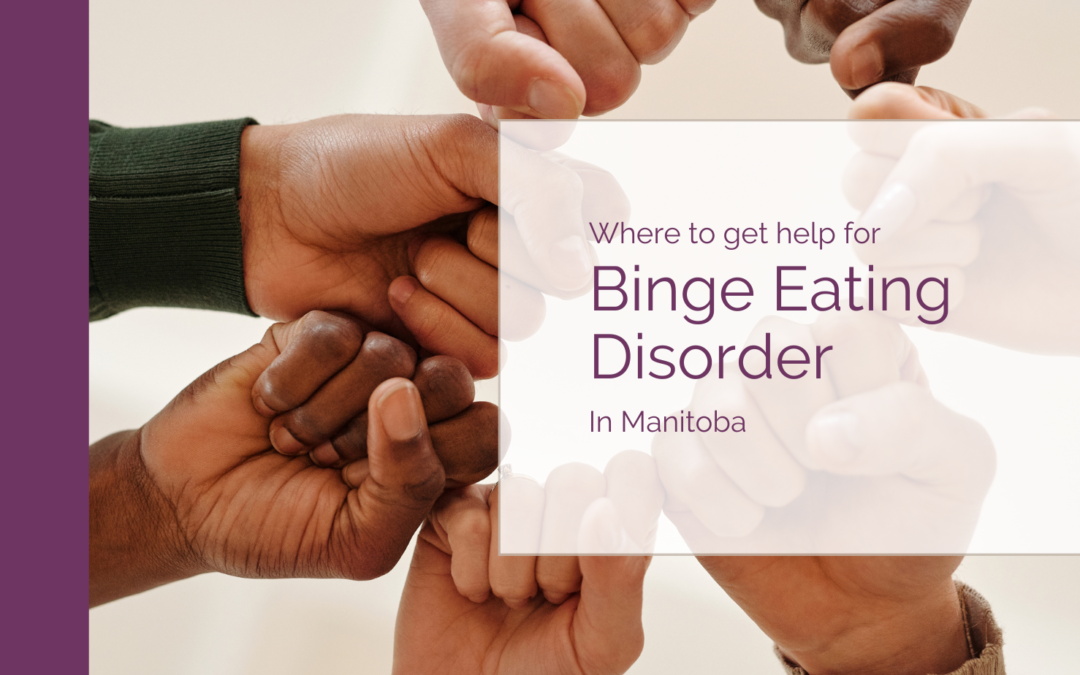Are you looking for resources for Binge Eating Disorders in Manitoba? Manitoba has several resources available to help you or your loved one on their path to recovery. Binge Eating Disorder is a complex and severe mental health condition and Canada’s most common eating disorder. Binge eating can have long-term physical and emotional consequences if left untreated. Seeking help from healthcare professionals, mental health services, and support groups can provide the guidance and support necessary to address the underlying psychological issues. Plus, learn to cultivate a more positive and nutritious connection with both food and your physical self. This blog post will explore some of the resources available in Manitoba for Binge Eating Disorders.
Understanding Binge Eating Disorder
Have you ever found yourself devouring an uncomfortable amount of food in one sitting? You’re not alone. Binge Eating Disorder is a real and serious condition that affects many individuals.
Binge Eating Disorder is a condition where individuals experience uncontrollable episodes of overeating, consuming large amounts of food in a short period of time. It’s not just about being hungry – individuals with binge eating disorder may eat even when they’re not hungry or continue to eat past the point of fullness. And they often do it in secret, ashamed of how much they’re eating.
Moreover, the consequences of binge eating don’t end there. Following such episodes, individuals often experience intense feelings of guilt, shame, and self-disgust. These negative feelings can lead to a vicious cycle, where those with binge eating disorders resort to restrictive dieting in an attempt to compensate for their overeating.
Here are some common signs and symptoms of binge eating disorder that you should be aware of:
- Regularly consuming large amounts of food within a short period of time, feeling like you have no control over your eating during these episodes, and experiencing distress, self-disgust, or guilt afterward.
- Consuming excessive amounts of food, regardless of hunger, and persisting in eating even when satiated.
- Eating rapidly during binge episodes and eating alone due to shame or embarrassment
- Hiding or stockpiling food to eat in secret later
- Chronic dieting, fluctuations in weight, and preoccupation with body shape and weight. However, it is important to note that you can’t tell who is struggling with an eating disorder based on body size or appearance alone.
- Having low self-esteem and feelings of worthlessness or hopelessness
- Social withdrawal or isolation due to shame or embarrassment about eating habits
- Gastrointestinal problems, such as bloating, constipation, or other digestive issues
- Depression, anxiety, or other emotional disturbances
Possible Medical Complications That May Arise
Binge Eating Disorder can lead to serious medical complications. It can also have significant emotional and social consequences, including anxiety, depression, low self-esteem, and strained relationships.
Individuals with Binge Eating Disorder may exhibit the following physical consequences:
- Binge eating can cause gastrointestinal problems, such as bloating, acid reflux, constipation, nausea, diarrhea, and abdominal pain.
- Extreme hunger or fullness at bedtime can create difficulties falling or staying asleep.
- Menstrual irregularities
- Dry skin and brittle hair, hair loss
- Fatigue, low energy
- Nutrient deficiencies caused by restrictive dieting
Binge eating disorder is a complex and severe medical condition that should not be dismissed as a lack of willpower or weakness. If you or someone you know is dealing with a binge eating disorder, it’s important to seek professional help from a healthcare provider or mental health expert specializing in eating disorders.
Causes of Binge Eating Disorder
Binge eating disorder is a multifaceted condition that can have various underlying factors. Some of the possible causes of binge eating disorder include:
- Genetics: Studies suggest that genetics may contribute to the development of binge eating disorders. People with a family history of eating disorders may be more likely to develop the condition.
- Environmental factors: Binge eating disorder can be triggered by various adverse childhood experiences such as trauma, abuse, neglect, a history of food insecurity, and others.
- Psychological factors: Binge eating disorder is often associated with emotional distress, such as anxiety, depression, and low self-esteem.
- Dieting and restrictive eating: Chronic dieting or frequent restriction of food intake can increase the risk of binge eating disorder. The body may respond to periods of deprivation with episodes of binge eating to try to ensure adequacy.
- Neurochemicals: Research has shown that imbalances in certain neurotransmitters, such as serotonin and dopamine, may contribute to the development of binge eating disorder.
- Social and cultural factors: Societal pressure to achieve a certain body type and exposure to media images that promote thinness can contribute to the development of binge eating disorder due to restriction.
Acknowledging that binge eating disorder is a complex condition is essential, as its onset is typically not caused by a single factor. Instead, it typically involves a combination of genetic, environmental, and psychological factors. Early intervention and treatment are critical in helping individuals recover from binge eating disorders and prevent long-term health consequences.
Where to get help for Binge Eating Disorder in Manitoba
Get a Physical Check-Up
If you suspect that you, your child, or someone you know in Manitoba is grappling with a binge eating disorder, it may be beneficial to schedule a physical health check-up with a family doctor or primary care provider. A physical evaluation is essential for a comprehensive assessment of the individual’s physical health and can help identify any medical complications or risks associated with the disorder.
However, it’s important to recognize that healthcare professionals may hold internalized weight bias that could lead to health care related weight discrimination. You must feel heard and understood by your healthcare provider, and they must not dismiss your eating concerns. People of all body shapes and sizes struggle with binge eating disorders, and it’s impossible to determine if someone is grappling with this condition based on their appearance alone.
You also have the option to request that you not be weighed or that your healthcare provider completes a blind weight (if it is medically necessary). Blind weighing entails stepping onto the scale without looking at the number or discussing it with the healthcare provider.
In addition to a physical exam, a healthcare provider may conduct a mental health assessment to evaluate the individual’s emotional well-being and any underlying psychological factors contributing to binge eating disorder. A mental health assessment can help to determine the appropriate treatment plan and referrals to specialized eating disorder treatment programs.
Reach Out for Support
When struggling with a binge eating disorder, seeking support from loved ones is crucial. Seeking help can significantly aid in the process of recovery. Eating disorders, including binge eating disorder, can be incredibly isolating, but having a solid support system can offer encouragement and motivation to seek treatment.
Here are some tips for reaching out for support:
Be honest
- If you have support from people in your life that you trust, it can be helpful to be transparent with these individuals about your struggle with an eating disorder and request their help and support. We can dismantle barriers and cultivate empathy and understanding by being open and candid about our challenges.
Educate your loved ones.
- Educating your support system, whether it be friends or family, can be helpful. Many people may not be fully aware of the condition and its symptoms. If you feel comfortable doing so, educating your loved ones can assist them in comprehending what you’re going through and how they can provide the best support possible. If it feels challenging to explain, you can also direct them to resources on binge eating disorders, such as this blog post.
Be specific about what you need.
- It’s important to communicate the type of support you require to your friends and family. Support can take many forms, such as having someone to talk to when you’re feeling low, sharing a meal together, or having someone accompany you to treatment appointments.
Set boundaries
- It can be helpful to set boundaries with your loved ones and communicate what is and is not helpful to you. Boundaries can help to prevent unintentional harm and ensure that your support system is genuinely helping you. Some common boundaries that may be helpful are asking people not to comment on or discuss food, diets, or bodies.
Consider joining a support group.
- There are many support groups for individuals with eating disorders. Joining a support group can provide a sense of community. Plus, provide you with support from others who have experienced similar struggles.
Self-Help Books
- Self-help books can be helpful for individuals with Binge Eating Disorder who are seeking to recover. Here are a few options:
The Body Is Not an Apology: The Power of Radical Self-Love” by Sonya Renee Taylor
- This book offers a powerful message of self-acceptance and self-love. Focusing on rejecting society’s unrealistic beauty standards.
Unapologetic Eating by Alissa Rumey
- This book helps you question societal expectations, examine your history with food and your body, and walk you through what a healthier relationship with food might look like.
Intuitive Eating and The Intuitive Eating Workbook: Ten Principles for Nourishing a Healthy Relationship with Food by Evelyn Tribole and Elyse Resch
- This workbook provides practical exercises and strategies for learning to trust your body. Plus how to develop a healthy relationship with food.
Although self-help books cannot replace individual treatment, they can be an excellent starting point if you are unable to reach out to a healthcare provider due to financial limitations, negative past experiences with healthcare providers, or if you are not yet prepared to speak with someone.
Connect with Local Services in Manitoba
Connect with local services that help with the recovery of Binge Eating Disorder in Manitoba.
- Book an appointment at A Little Nutrition with the team of Registered Dietitians and Therapists who help Adolescents and Adults recover from disordered eating and eating disorders through in-person and virtual appointments.
- Join the free virtual Eating Disorders Caregivers Support Group at A Little Nutrition if your child struggles with an eating disorder.
- Get on the waitlist for treatment at Women’s Health Clinic, which provides treatment for adults with eating disorders covered by Manitoba Health.
- Contact a helpline: For support and resources, contact the NEDIC helpline at 1-866-NEDIC-20 and live chat services are available: 8 am – 8 pm Monday – Thursday, 8 am – 4 pm on Friday, 11 – 4 pm on Saturday and Sunday.
- Join the Mood Disorders Association of Manitoba Disordered Eating and Body Image Support Group
Remember, getting help is essential. Several resources are available to support your recovery journey from Binge Eating Disorder in Manitoba. Don’t be afraid to ask for assistance and guidance.






